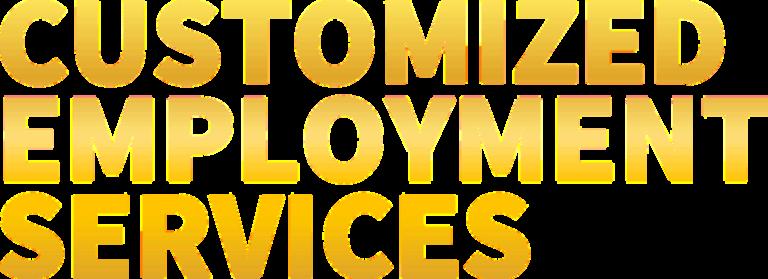









Learn how your WorkBC Centre
Learn about the support
through WorkBC and what your employment search journey will look like.
Assists
WorkBC

WorkBC Centres are here to support you in finding a job and keeping it.
WorkBC Employment Services are available to all British Columbians who are seeking employment and are legally eligible to work in B.C. The program offers a range of services that support individuals looking for work to find and maintain a job and to improve employment readiness.
Your WorkBC Centre will help you identify what personal supports and services you are eligible to receive and meet your needs.
A good job makes all the difference, and WorkBC can help you find your place. Explore new opportunities, upgrade your skills or train for a new career.
Read on to learn about the personal supports and services you may be eligible to receive.

All job seekers can use the self-serve resource area that contains everything you need to conduct a successful job search.
What's in the Resource Room?
Computer workstations with internet access
Telephones
Photocopiers and scanners
A job board with up-to-date local job postings
Information on local employers and their hiring practices
Resume and cover letter resources
Staff support to help you access the resources available to you in the self-serve area
Self-serve assessment tools to assist you with career and job planning
Information on financial supports that you may be eligible for if you need help getting started in a new job or need help looking for work
Service in a language other than English or in alternative formats, if appropriate and necessary
All WorkBC Centres meet accessibility standards.

Looking for work, applying for jobs, and interviewing for opportunities can be stressful, and it can be difficult to know where to turn for help and resources. WorkBC Centres are here to help you get started and will work with you to achieve long-term employment.
Are you legally permitted to work in British Columbia, and meet one of the following: Unemployed?
Have a disability?
Are you employed or self-employed in a job that: Is unlikely to continue long-term and has irregular hours of work (e.g., casual work, on-call work)?
Has unreliable pay (e.g., piecework, commission) that does not provide enough income to support you or your family?
WorkBC offers many options that can support you to find and maintain a job and to improve your employment readiness.

Some of the supports you will receive include:
• Employment-focused workshops (remote access is available)
• Job search advice and support, resume development and interview skills practice
• Career counselling, career decision making, and career assessments (including disability-related employment needs)
• Wage subsidies*
• Skills enhancement training*
• Self-employment program
• Financial needs assessments for potential expenses related to job search, job start, participation in centre activity and/or eligibility for training
• Specialized services for people with disabilities and people with multiple barriers to accessing employment, including customized employment, job development, work experiences, job shadowing, assistance obtaining assistive devices necessary for employment and self-employment
• Employment-targeted assessments to assist in supportive, realistic, reasonable employment/community attachment
• Job sustainment services to assist you in maintaining employment
*Must meet program specific eligibility criteria to participate

The Skills Training for Employment program meets the needs of vulnerable and under-represented groups by providing skills training and employment supports to participants to help them obtain sustainable employment.
Adult Basic Education and Academic Upgrading
WorkBC offers Adult Basic Education (ABE) and Academic Upgrading to help clients complete high school graduation requirements or prepare for higher levels of training or employment. This includes:
- Grades 8 through 12
- Basic literacy and numeracy
- English as a Second Language (ESL)
- BC Adult Graduation Diploma (General Educational Development - GED)
Occupational Skills Training helps clients develop industry-specific skills. The training must lead to a certificate, diploma, or degree recognized by educational institutions or industries and must address in-demand skills in the local labour market. This training aims for sustainable employment.
This type of training provides industry-specific skills and knowledge for employment Examples of Short Duration Training include OFA 3 and Class 3 Training.
Short Term Orientation and Certificate (STOC)
STOC training help clients meet minimum job entry requirements. Common topics include:
Emergency First Aid
Super Host
FOODSAFE
WHMIS (Workplace
Hazardous Materials
Information System)
Serving It Right
H2S Alive
Transportation of Dangerous Goods
Basic Computer Training
Other essential industry certificates







WorkBC helps new employees cover the costs associated with starting a new job, ensuring they are prepared from day one.
Mandatory Work Gear: Steel toe boots, non-slip shoes.
Certifications: First Aid, Foodsafe.
Transportation Supports: Help with getting to work.
Assistive Technology for Disabilities: Ergonomic furniture, hearing devices. & more
Provide a verification of employment or job offer with:
- New employee’s name
- Job title and duties
- Start date
- Hours per week
- Wage rate
- Employer contact information
- List of required items (e.g., steel toe boots)
- Visit or book an appointment with their local WorkBC Centre.
- Bring ID, SIN number, and employment confirmation letter.
- Book an appointment with WorkBC as soon as possible to avoid wait times.
- Requests will be processed quickly.



Do you need work experience and onthe-job training? WorkBC can pay an employer a percentage of your wages for up to 24 weeks!
The Wage Subsidy program matches WorkBC clients who require on-the-job training and work experience with employers who can offer support, supervision, and training to their new employee. The temporary subsidy covers a part of employee wages in exchange for coaching and on-the-job training.

A job seeker must be: A B.C. permanent resident or Canadian Citizen
1. Unemployed (not working full-time, part- time, temporarily, etc.)

2. Identified for this service through a WorkBC service provider 3. In need of work experience 4.
Is the WorkBC Wage Subsidy Program only available for B.C. jobs?
Yes, all individuals subsidized under a WorkBC Wage Subsidy must be in a position where the job and work are primarily done in B.C.



The goal of Self-Employment Services is to help individuals create jobs for themselves by starting their own businesses. This service provides entrepreneurial skills development, support, and financial assistance to eligible individuals while they develop and implement their business plans and become self-employed.
Self-Employment Services are available to British Columbian job seekers who:
Are legally eligible to work in B.C.
Meet general WorkBC program eligibility.
Have had annual insurable earnings over $2000 and paid EI premiums in any 5 out of the last 10 years, or had an EI benefit period that ended within the last 60 months, or have a Disabilities designation or Persistent Multiple Barrier status.
For full eligibility details, speak with one of our WorkBC Centre staff.
Participants will develop a business plan that assesses viability, community impact, and their aptitude and experience.
Full time participation in Business Plan Development and Launch.
The Self-Employment Coordinator supports and monitors business plan development and implementation.
Self-Employment Orientation and Assessment
Business Concept Development
Business Plan Development
Business Launch and Implementation
To be considered for SelfEmployment Services, the business must be:
- A new business, or
- An existing business in which the participant had no prior ownership, and
- A business that will not put another individual out of business.



Customized Employment is a flexible process that matches your strengths and needs with an employer's requirements. This program helps individuals with disabilities or other employment barriers find and keep jobs.
Customized Employment uses an individualized assessment of your strengths, needs and interests, compiled through the discovery process, and the development of a Customized Employment Profile to identify best-match scenarios between work environments, supports, interests and work tasks.
You are a person who identifies as having a disability and will benefit from individualized and supported assistance in your job search
You are a person who has not been successful in securing or maintaining a job through traditional employment/job search activities
You are a person who has an identified barrier to employment and lacks skills required to achieve and/or maintain sustainable employment
You are a person who would benefit from ongoing support that would exceed an employer’s ability to accommodate, such as one-on-one training time, assistive technology, additional accommodations at the work site or additional assessments
The customized employment process includes a discovery assessment, networking meeting with the job seeker and their friends, family and/or support workers As a team, we seek employers who are known to the client’s network or are supportive in enabling people to live with dignity and respect.
WorkBC works with employers to uncover any unmet needs in the workplace and provide support and resources, including workplace accommodations required for both the job seeker and the employer to be successful.


Unpaid work experiences place eligible job seekers in short-term positions with a work experience host.
Job seekers gain valuable work experience and improve their employment readiness skills by working in true employment environments. The employment setting allows job seekers to confirm their occupational choices, enhance skills and network with potential employers, and supports the WorkBC team in assessing job seekers’ capacity and skill gaps. We focus on placements that fit with individual job seekers’ backgrounds, interests and needs and collaborate with potential employers to find the right fit.


Unpaid work experiences are normally eight weeks or less of full-time (35 hours per week) unpaid employment. They should be a collaborative threeway process between the job seeker, a work experience host, and WorkBC. WorkBC provides ongoing support during the work experience period for both the job seeker and work experience host.
• Valuable insight into the world of work
• Opportunity for career exploration and assessment
• Opportunity to meet potential future employers and explore different work environments
WorkBC will:
• Identify potential job seekers
• Facilitate meaningful work experience duties with the work experience host
• Monitor the placement to ensure success of both the job seeker and the work experience host
The work experience host will:
• Provide the job seeker with a meaningful work experience designed to facilitate employment readiness and provide an opportunity for the job seeker to gain needed skills relevant to his or her interests, needs and objectives.
• Supply the labour, knowledge, expertise, materials, facilities, approvals, licenses and other charges or costs necessary for the job seeker’s participation in the unpaid work experience.
(Note: job seekers may be eligible for financial supports to enable their participation.)
• Provide WorkBC with information needed to monitor and support the unpaid work experience, including job seeker participation and attendance data.

